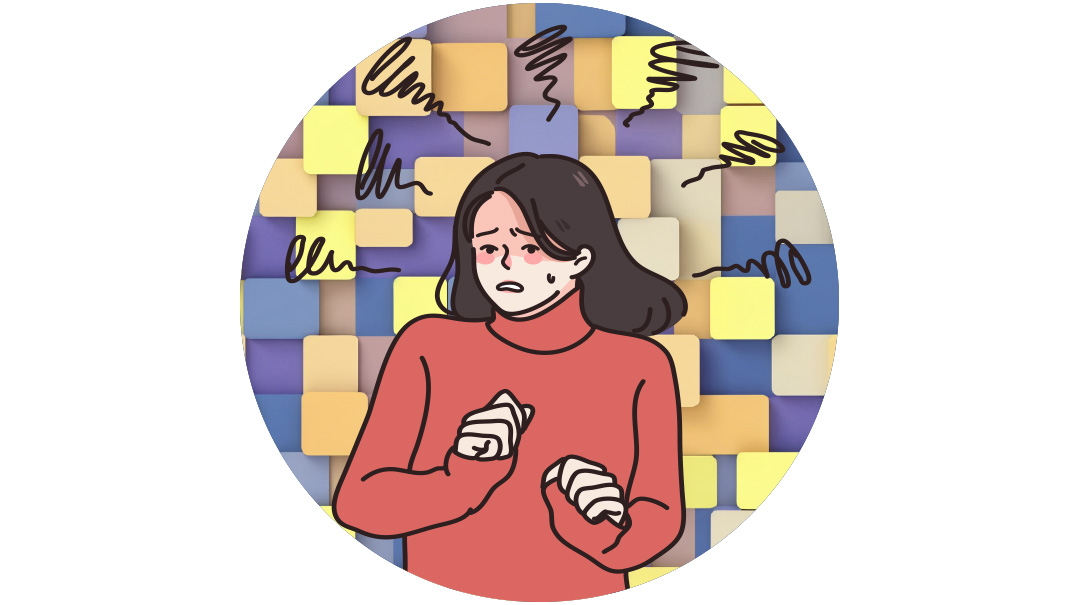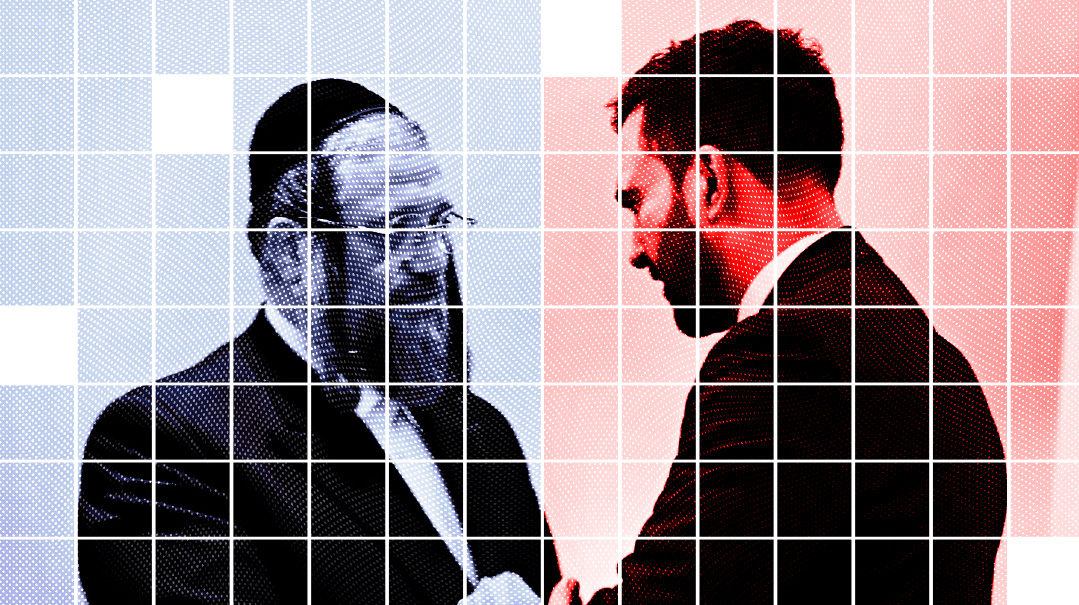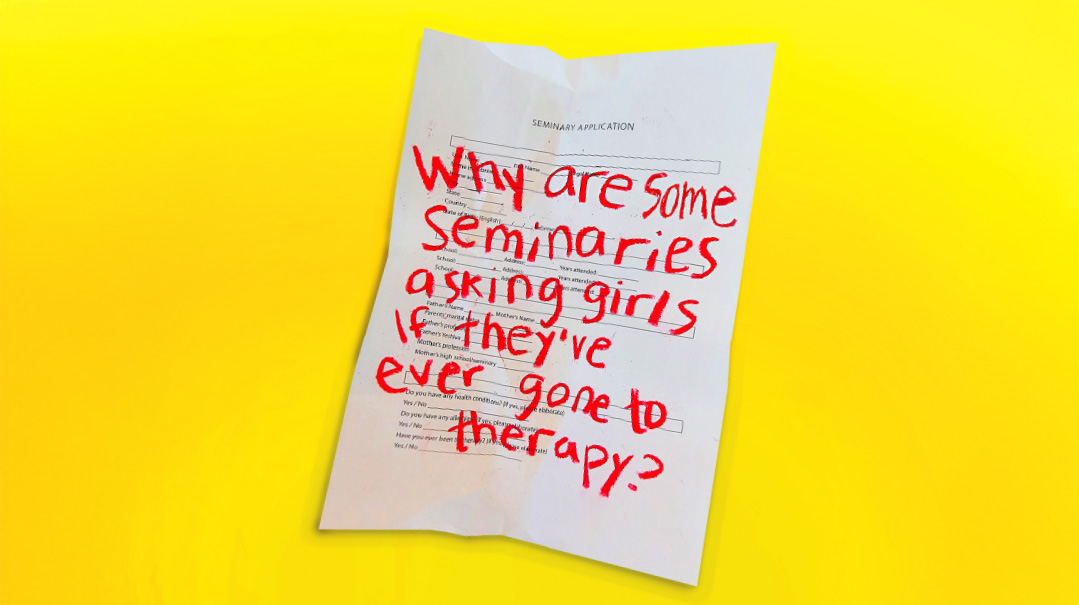A Letter from a Teen — The Conversation Continues

Our readers weigh in on whether we should honor our teens’ requests for therapy

Sarah Rivkah Kohn wrote a two-part column, the first addressing a teen whose parents denied her request to go to therapy for what she thought was panic attacks, and the second addressing her parents and their reluctance to listen to their daughter. A followup inbox letter criticized the column for giving too much credence to the teen’s perspective and not trusting her parents’ judgment enough. Here, our readers weigh in on whether we should honor our teens’ requests for therapy.
It Doesn’t Hurt to Rule It Out
I had a lot of thoughts about this issue.
Most of my children are now married and raising their own families. Recently, one of my daughters went on medication to treat postpartum depression and anxiety. She shared that this depression and anxiety weren’t new experiences for her, and that she’d tried explaining it to me years back, but I didn’t hear her.
She didn’t say it with anger, baruch Hashem, and I was able to apologize. Honestly, 11 years ago when she shared this, I think we all were a lot less psychologically aware — I certainly was. I also think she gave up far too fast after mentioning it to me once. I do believe that one of the points Mrs. Kohn made, and that needs to be made, is that as parents, sometimes we are frazzled and dealing with 17 things at once and sometimes the child in the family who gets heard is the one who can repeatedly, continue to make a point. I know that would’ve been true for me. Had my daughter mustered up the courage to talk to me again and again, even with my lack of awareness, I would have realized this is something important.
I had a child who was quite mischievous, and at the age of eight claimed he couldn’t see the board and needed an emergency eye doctor appointment. I saw it as yet another way for him to get out of school, but after he said it twice, I figured I would check it out just in case. Lo and behold, the kid needed glasses badly. I think the same is true with any area. Sometimes we take children less seriously because of their history, but it certainly can’t hurt to do some sort of rule-out.
L.I.
Monsey, NY
Need Someone Subjective
You would think as a licensed social worker I wouldn’t be afraid of therapy, but I very much pushed off sending a teen of mine to therapy for fear of what she would make me sound like in the therapy room.
I let my ego get in the way until my husband finally knocked sense into me. It’s been humbling to recognize that even with all my training and skills, I can’t help my child on my own because she needed someone objective for the issues she was dealing with.
So I get this parent’s fear so, so much. I read my daughter books, practiced skills, etc., but it didn’t help because she needed me to be the Mommy and the therapist to be the therapist. I think it’s key as parents that we offer our whole selves to the child, but also not shy away from using every tool at our disposal.
One last thing I want to add is this: I’ve done so many sessions with children and teens that lasted one to three times, after which I can usually tell the parent either that the child doesn’t need therapy or that there’s a different route to take. There is almost no quality therapist I know who would keep seeing a teen for no reason, so it’s certainly worth checking it out, and worst case, they will validate that there is no need for therapy.
Humbled
Brooklyn, NY
Parents Don’t Feel Therapy Is Safe
Parents are legitimately afraid of sending their children to therapy because some therapists are really getting it wrong. Many times a teen enters therapy for something innocent and a therapist makes it into something much more major, after which the teen seems to get worse, and the parents feel hopelessly out of the loop because few therapists care to update the parents. Is it any wonder parents seek to prevent this?
I think that while you might be right that the teen should perhaps approach her parents again, I believe the parents’ resistance is coming from a place of not feeling therapy is safe. I believe it behooves therapists to prove to parents that they’re indeed on the same team.
Leah Rochel R.
Lakewood, NJ
Parents Don’t Know Everything
I was having dissociative panic attacks as a preteen. I told a parent whom I trusted and they told me it’s nothing. I specifically said I think I need to speak to a therapist, and it was dismissed. Because I trusted my parent so much, I believed they knew best, and I didn’t do anything about it. I suffered for years. I learned to hide my attacks when in a public setting (benefits of dissociative-type), so it really wasn’t obvious and probably never would have been noticed.
I was in my early 20s when I finally went to therapy (ironically for something else) and finally faced it. I was in my mid-20s when I was finally able to (mostly) get rid of my dissociative panic attacks.
When I asked my parent why they dismissed me so many years prior, they said they thought I would just grow out of it. They had no idea I was struggling as long as I was because they couldn’t see it.
I wish I’d understood as a preteen and teen that parents aren’t G-d; that they make mistakes. They don’t always understand. I think it would have given me the perspective to repeatedly ask for the help I needed, or at least pursue it on my own when I was 18 and not dismiss my own struggle. It wouldn’t have made my respect toward my parent any less. It would have made me healthier and stronger and saved me from the struggles I had with myself and in my relationship with my parent years after.
Y.D.
Brooklyn, NY
I Hear the Dilemma
I’m a teen and I do agree that teens sometimes over-dramatize and say they need therapy just because they got “inspired.”
I also know that some of my friends are doing things that would shock their parents… except they tried telling them.
I’m too young to say what to do, but I do hear the dilemma.
A Teen
Take Accountability
Whether the child needs therapy or not, dismissing her pain is definitely a damaging approach. This is why if you read a few pages ahead, you’ll see an ad for support for parents whose children won’t talk to them and withhold the grandchildren. And who do they blame? Why, the therapists of course. When I was a kid, they blamed “bad friends,” and when my parents were kids they blamed the “goyish movements.” We’d do a lot better to take accountability instead of deflecting.
What I’ve learned in my (not long) life is that my children are placed on a unique path set for them by Hashem. They’re not even “my” children. They’re Hashem’s children entrusted in my care. I’m only here to love, protect, and support them. Of course, it rips my heart out when they struggle and it makes sense to either want to jump in and smooth everything over for them or to deny that a problem even exists. If those were good strategies, there wouldn’t even be a therapy industry.
Just like “maching avek” physical symptoms can often lead to discovering horrible illnesses at advanced stages, and ignoring credit card debt leads to bankruptcy, etc., ignoring or denying emotional struggles leads to lifelong challenges and often balloons into full-blown mental illness. I hope and pray that the klal finds the courage to accept our G-d-given challenges and to tackle them with our G-d-given tools (a.k.a. therapists).
All For Therapy
Teenage Drama or Not?
I’m a mother of toddlers, teens, and marrieds, and a grandmother to five kein ayin hara. For the last 16 years, I’ve taught in two Bais Yaakov high schools, and before that, taught preteens.
Therapy used to be hush-hush, but now with magazines like Mishpacha, our teens are quite well-versed in many mental health issues. I come into class and begin talking about something and have girls tell me how much it can trigger someone with a particular issue. I’m honestly exhausted by how many things are no longer met with resilience, but with a feeling that our teens will fall apart in a minute.
And then…
I also have teens who have suffered needlessly and whose parents couldn’t see it.
How do we know the difference? A lot is instinctive. A lot is not. I don’t know.
A Confused Teacher
If She Asked, She Needs It
I could not have been the only one to notice that in the same issue as the letter about Sarah Rivkah Kohn’s article was a new piece that she wrote entitled, Stop “Sending” Kids to Therapy!
I think that is the answer. We don’t need to send kids to therapy, especially against their will, but when someone, child or adult, asks or wants to go — that is what changes the dynamic.
It’s weird that we still refuse to equate mental health issues with medical issues. Yes, you can say kids have stomachaches because they want to be dramatic or excuse themselves, but why? Because if they just said, “I’m afraid,” we often wouldn’t hear them… emotions don’t grab our attention. Double over in physical pain and there is no parent who won’t want to rule out anything physically wrong, and there is a certain amount of soothing we do.
The key here is the girl asked. She asked her parents to notice that she was in pain. To have that dismissed could leave a teen feeling helpless. I think we’re getting caught up in should she go to therapy or not instead of asking should her thoughts and ideas be important to her parents.
Sheindy Weiser
It’s the Way to Their Hearts
Teens feeling smarter than their parents isn’t something new. The Chovos Hatalmidim addressed this, and may I mention that he wrote that sefer before World War II. He wrote how teens of his day felt they were the smartest, smarter than their parents or mechanchim (hence the advent of all those isms), and that they need the adults to make them feel that they value their insights and wisdom and opinions, and only in that way, can the adults influence the kids.
This was written almost 100 years ago, and I don’t think teens have changed much in that way. So yes, to the reader who wonders why we listen to a teen: because that’s the way to their hearts.
Let’s look at this in a different way: This teen didn’t feel understood, so she wrote a letter to a respected member of the community via a magazine, something that is both brave and also problematic, as she’s seeking advice from someone who is a stranger to her. Lucky for these parents she didn’t turn to a stranger outside of the community….
This is part of the reason why it’s unwise to allow children and teens to feel they don’t have a voice and that their needs aren’t understood.
Name Withheld
What Do the Parents Think?
While I often appreciate the bite-size therapy pieces — this one felt off. It felt inappropriate to guide a teen without hearing what her parents say or think about the situation.
Maybe she also tells them she thinks she has a tumor when she has a headache? How do they know when and if to take her seriously? And by teaching a child to befriend the feeling, breathe through it, and move on, you’re making the anxiety and panic lose power.
I actually see merit in the parents empowering the teen by saying, “You can beat that!”
M. Schwartz
Monsey, NY
That’s the Point
In Sarah Rivka Kohn’s response to the woman who was concerned about the message she was sending to the teen, she ends by asking us to swap out the teen for a wife: “If a woman tells her husband she feels like she’s having panic attacks, and he tells her he’ll teach her skills, and she shouldn’t get other help, we’d be up in arms that the spouse is being harsh and not understanding or whatever.”
I’m not sure why we’re swapping a teen for an adult here. The point is that a teen isn’t an adult, and while of course teens should be heard and validated, the parents are the adults who should, by definition, hold more authority than the child.
One adult sharing with another adult is very different than one (teen) child sharing with an adult.
N.W.
Omaha, NE
All They Need Is to Be Listened To
In some cases, teens need help articulating what they mean. But dare I say it? In even more cases, the issue is not their ability to articulate themselves that needs help, they just need to be listened to. A parent may well listen and understand the teen’s feeling and still feel that the answer is no. If someone is in a position to counsel teens, it’s very nice (and feels very good) to help the teen find ways to get their wants met. But it’s likely more important to help the teen tune in and listen to her parents and see why her parent is responding the way they are. Because in the vast majority of cases, it’s the parents who truly love their child, care for them, and have their best interests at heart.
A Listening Parent
(Originally featured in Family First, Issue 910)
Oops! We could not locate your form.







